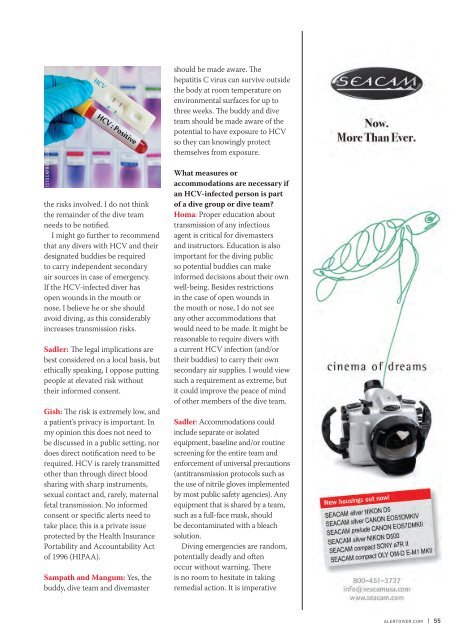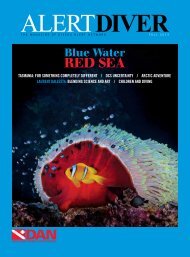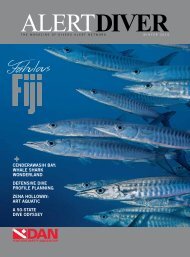AD 2017 Q4
Alert Diver is the dive industry’s leading publication. Featuring DAN’s core content of dive safety, research, education and medical information, each issue is a must-read reference, archived and shared by passionate scuba enthusiasts. In addition, Alert Diver showcases fascinating dive destinations and marine environmental topics through images from the world’s greatest underwater photographers and stories from the most experienced and eloquent dive journalists in the business.
Alert Diver is the dive industry’s leading publication. Featuring DAN’s core content of dive safety, research, education and medical information, each issue is a must-read reference, archived and shared by passionate scuba enthusiasts. In addition, Alert Diver showcases fascinating dive destinations and marine environmental topics through images from the world’s greatest underwater photographers and stories from the most experienced and eloquent dive journalists in the business.
Create successful ePaper yourself
Turn your PDF publications into a flip-book with our unique Google optimized e-Paper software.
ISTOCKPHOTO.COM<br />
the risks involved. I do not think<br />
the remainder of the dive team<br />
needs to be notified.<br />
I might go further to recommend<br />
that any divers with HCV and their<br />
designated buddies be required<br />
to carry independent secondary<br />
air sources in case of emergency.<br />
If the HCV-infected diver has<br />
open wounds in the mouth or<br />
nose, I believe he or she should<br />
avoid diving, as this considerably<br />
increases transmission risks.<br />
Sadler: The legal implications are<br />
best considered on a local basis, but<br />
ethically speaking, I oppose putting<br />
people at elevated risk without<br />
their informed consent.<br />
Gish: The risk is extremely low, and<br />
a patient’s privacy is important. In<br />
my opinion this does not need to<br />
be discussed in a public setting, nor<br />
does direct notification need to be<br />
required. HCV is rarely transmitted<br />
other than through direct blood<br />
sharing with sharp instruments,<br />
sexual contact and, rarely, maternal<br />
fetal transmission. No informed<br />
consent or specific alerts need to<br />
take place; this is a private issue<br />
protected by the Health Insurance<br />
Portability and Accountability Act<br />
of 1996 (HIPAA).<br />
Sampath and Mangum: Yes, the<br />
buddy, dive team and divemaster<br />
should be made aware. The<br />
hepatitis C virus can survive outside<br />
the body at room temperature on<br />
environmental surfaces for up to<br />
three weeks. The buddy and dive<br />
team should be made aware of the<br />
potential to have exposure to HCV<br />
so they can knowingly protect<br />
themselves from exposure.<br />
What measures or<br />
accommodations are necessary if<br />
an HCV-infected person is part<br />
of a dive group or dive team?<br />
Homa: Proper education about<br />
transmission of any infectious<br />
agent is critical for divemasters<br />
and instructors. Education is also<br />
important for the diving public<br />
so potential buddies can make<br />
informed decisions about their own<br />
well-being. Besides restrictions<br />
in the case of open wounds in<br />
the mouth or nose, I do not see<br />
any other accommodations that<br />
would need to be made. It might be<br />
reasonable to require divers with<br />
a current HCV infection (and/or<br />
their buddies) to carry their own<br />
secondary air supplies. I would view<br />
such a requirement as extreme, but<br />
it could improve the peace of mind<br />
of other members of the dive team.<br />
Sadler: Accommodations could<br />
include separate or isolated<br />
equipment, baseline and/or routine<br />
screening for the entire team and<br />
enforcement of universal precautions<br />
(antitransmission protocols such as<br />
the use of nitrile gloves implemented<br />
by most public safety agencies). Any<br />
equipment that is shared by a team,<br />
such as a full-face mask, should<br />
be decontaminated with a bleach<br />
solution.<br />
Diving emergencies are random,<br />
potentially deadly and often<br />
occur without warning. There<br />
is no room to hesitate in taking<br />
remedial action. It is imperative<br />
ALERTDIVER.COM | 55









